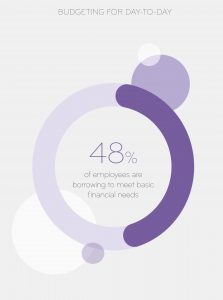Why braving the debt taboo leads to a healthier workforce
This post written by Heidi Allan, Head of Employee Wellbeing at Neyber, is based on her recent presentation to C3’s Workplace Health Movement on ‘Employee wellbeing – the financial wellness story’.
Taboo topic: financial wellbeing
There’s a huge focus today on wellness, with countless voices across the media providing advice on everything from diets to exercise programmes. Where mental health is concerned we’ve experienced a revolution in the way that it is openly discussed and this is thankfully helping to remove the stigma associated with the condition. This developing trend will ultimately lead to a more mindful healthier society, where people live longer and better lives.
One major taboo, however, exists and our failure to address this has ramifications for the physical and mental health of people like you and me across the UK. This taboo relates to our inability to discuss financial wellbeing and, in particular, indebtedness. For many people this can cause stress and deny them the opportunity to put their financial affairs in order. It also means that short-term fixes are put in place when cash is scarce, when long-term solutions are what is needed. This is why so many people have racked up credit card debts or taken out payday loans and are paying ridiculous rates of interest as a consequence.
The DNA of Financial Wellbeing
To put an end to this needless spiral of indebtedness, financial mindfulness offers the way to achieve this. The best definition that we’ve found of mindfulness comes from Janice Marturano, Deputy General Counsel of the US corporation General Mills. She defines it as “training our minds to be more focused, to see with clarity, to have spaciousness for creativity and to feel connected.”
Where our finances are concerned there has never been a greater need for financial mindfulness. Our research programme – The DNA of Financial Wellbeing – shows the scale of the crisis people across the UK are facing.
Our research shows us that debt and financial worries are having a negative impact on concentration, sickness, absence and energy levels of UK employees. These are all causing suboptimal performance in the workplace.
Out of over 10,000 people surveyed we’ve found that almost 6 in 10 (58%) have been affected by money worries in the past year, in ways such as feeling stressed (34%) anxious (31%) and depressed (19%) and losing sleep (24%).
Almost half (48%) are regularly borrowing to meet basic monthly financial needs and 26% said they had used a credit card (which often charge rates of around 20%) for basic needs.

Chart from Neyber’s The DNA of Financial Wellbeing 2017 report
And it gets worse when you look at people’s ability to cope with a financial shock, with almost one quarter (24%) having less than one month’s savings to tide them over should their income cease or change – this could be through major events such as losing a job or ill health, or more minor things like a vehicle breakdown or something going wrong in their home.
These figures are worrying enough in their own right but we’re sure that when you look at the individuals concerned who are working hard to support their families or simply to just get by in life then what they are going through without financial mindfulness or openness is something of a national scandal.
This is why we believe that we need to extend the mindfulness revolution into our financial circumstances. To address the problems we need to get the issues out there and start talking about debt and enabling people to enjoy sustainable finances. In practical terms this means society focusing on what needs to be done and connecting with the financial issues that impact on people’s lives.
Working people across the UK are being charged far too much for credit. Putting mindfulness into practice means focusing on bringing this down to levels that are morally right and sustainable for borrowers. If we achieve this, then we will be removing a huge unspoken source of anxiety from the shoulders of people across the UK. And about time too.
Then we should start to experience a more engaged workplace. Employees able to better concentrate on their jobs, perform better and to feel that they are making a difference.
You can download the key findings of “The DNA of Financial Wellbeing” report at www.neyber.co.uk
Related post: Harnessing the power of the mid-life workforce to help employers, employees and society

